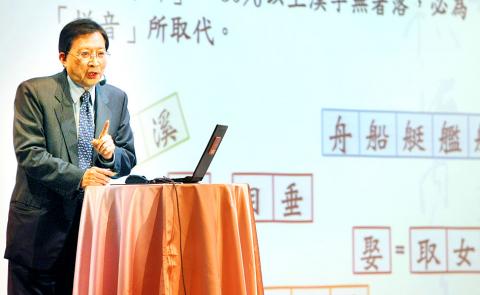President Ma Ying-jeou (馬英九) yesterday applauded the launch of an online cross-strait Chinese dictionary that incorporates a database on the languages used in Taiwan and China, a move to further bilateral cultural exchanges across the Taiwan Strait.
The launch of the online Chinese Language Knowledge Database (中華語文知識庫), compiled by the General Association of -Chinese Culture (GACC), an institution under the Presidential Office, implemented one of Ma’s campaign promises during the 2008 presidential election to establish a cross-strait dictionary and facilitate cross-strait cultural exchanges as people on either side of the Taiwan Strait use different Chinese characters and phrases.
“The best way to handle the differences between traditional and simplified Chinese characters is to list both and explain the -differences. The database will help the two sides understand each other and promote cultural exchanges. There are no political intentions,” Ma said at the launch ceremony.

Photo: CNA
While defending the use of traditional Chinese characters since his two terms as Taipei mayor, Ma said it would be difficult to ask China to adopt traditional characters or for Taiwan to use simplified Mandarin instead.
“What we should do is to understand the different languages and look at the characters from a non-political perspective. Maybe the two sides will develop a new set of characters that can be used and -that would be acceptable across the [Taiwan] Strait,” he said.
GACC chairman Liu Chao-shiuan (劉兆玄) said the database includes a compilation that juxtaposes characters and phrases commonly used by people from both sides of the Strait in their daily lives.
The online platform (chinese--linguipedia.org) can also be operated in a way similar to that of Wikipedia, allowing users to suggest more content or edit posted content after a submission is approved by experts, he said, adding that the association would eventually launch applications to extend the database service to users of smartphones and tablet computers.
The site includes a search -engine that allows users to look up words spoken by people from Taiwan and China. In addition to the definition, it will also show the equivalent used by the other side.
Ma said the database would also help the growing number of people who are learning Mandarin worldwide understand the differences between the languages adopted in Taiwan and China.
One of the examples he gave was the term “playing the trumpet” (吹喇叭), which means “giving someone a blowjob” in Taiwanese slang, but means “fawning over somebody” in China.
Additional reporting by CNA

Taiwanese Olympic badminton men’s doubles gold medalist Wang Chi-lin (王齊麟) and his new partner, Chiu Hsiang-chieh (邱相榤), clinched the men’s doubles title at the Yonex Taipei Open yesterday, becoming the second Taiwanese team to win a title in the tournament. Ranked 19th in the world, the Taiwanese duo defeated Kang Min-hyuk and Ki Dong-ju of South Korea 21-18, 21-15 in a pulsating 43-minute final to clinch their first doubles title after teaming up last year. Wang, the men’s doubles gold medalist at the 2020 and 2024 Olympics, partnered with Chiu in August last year after the retirement of his teammate Lee Yang

FALSE DOCUMENTS? Actor William Liao said he was ‘voluntarily cooperating’ with police after a suspect was accused of helping to produce false medical certificates Police yesterday questioned at least six entertainers amid allegations of evasion of compulsory military service, with Lee Chuan (李銓), a member of boy band Choc7 (超克7), and actor Daniel Chen (陳大天) among those summoned. The New Taipei City District Prosecutors’ Office in January launched an investigation into a group that was allegedly helping men dodge compulsory military service using falsified medical documents. Actor Darren Wang (王大陸) has been accused of being one of the group’s clients. As the investigation expanded, investigators at New Taipei City’s Yonghe Precinct said that other entertainers commissioned the group to obtain false documents. The main suspect, a man surnamed

US Secretary of the Treasury Scott Bessent and US Trade Representative Jamieson Greer began talks with high-ranking Chinese officials in Switzerland yesterday aiming to de-escalate a dispute that threatens to cut off trade between the world’s two biggest economies and damage the global economy. The US delegation has begun meetings in Geneva with a Chinese delegation led by Chinese Vice Premier He Lifeng (何立峰), Xinhua News Agency said. Diplomats from both sides also confirmed that the talks have begun, but spoke anonymously and the exact location of the talks was not made public. Prospects for a major breakthrough appear dim, but there is

The number of births in Taiwan fell to an all-time monthly low last month, while the population declined for the 16th consecutive month, Ministry of the Interior data released on Friday showed. The number of newborns totaled 8,684, which is 704 births fewer than in March and the lowest monthly figure on record, the ministry said. That is equivalent to roughly one baby born every five minutes and an annual crude birthrate of 4.52 per 1,000 people, the ministry added. Meanwhile, 17,205 deaths were recorded, resulting in a natural population decrease of 8,521, the data showed. More people are also leaving Taiwan, with net